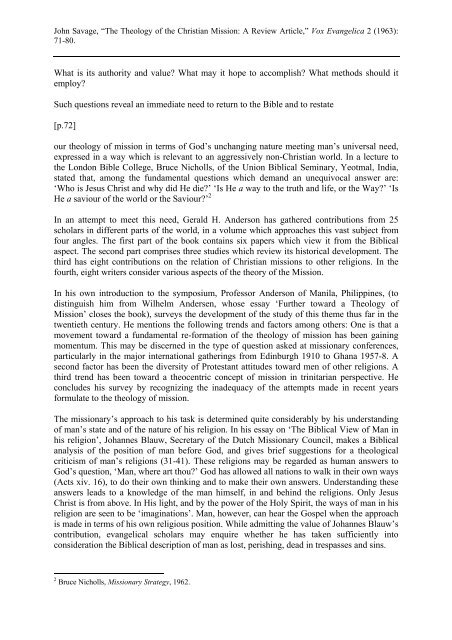The Theology of Missions
The Theology of Missions
The Theology of Missions
You also want an ePaper? Increase the reach of your titles
YUMPU automatically turns print PDFs into web optimized ePapers that Google loves.
John Savage, “<strong>The</strong> <strong>The</strong>ology <strong>of</strong> the Christian Mission: A Review Article,” Vox Evangelica 2 (1963):<br />
71-80.<br />
What is its authority and value? What may it hope to accomplish? What methods should it<br />
employ?<br />
Such questions reveal an immediate need to return to the Bible and to restate<br />
[p.72]<br />
our theology <strong>of</strong> mission in terms <strong>of</strong> God’s unchanging nature meeting man’s universal need,<br />
expressed in a way which is relevant to an aggressively non-Christian world. In a lecture to<br />
the London Bible College, Bruce Nicholls, <strong>of</strong> the Union Biblical Seminary, Yeotmal, India,<br />
stated that, among the fundamental questions which demand an unequivocal answer are:<br />
‘Who is Jesus Christ and why did He die?’ ‘Is He a way to the truth and life, or the Way?’ ‘Is<br />
He a saviour <strong>of</strong> the world or the Saviour?’ 2<br />
In an attempt to meet this need, Gerald H. Anderson has gathered contributions from 25<br />
scholars in different parts <strong>of</strong> the world, in a volume which approaches this vast subject from<br />
four angles. <strong>The</strong> first part <strong>of</strong> the book contains six papers which view it from the Biblical<br />
aspect. <strong>The</strong> second part comprises three studies which review its historical development. <strong>The</strong><br />
third has eight contributions on the relation <strong>of</strong> Christian missions to other religions. In the<br />
fourth, eight writers consider various aspects <strong>of</strong> the theory <strong>of</strong> the Mission.<br />
In his own introduction to the symposium, Pr<strong>of</strong>essor Anderson <strong>of</strong> Manila, Philippines, (to<br />
distinguish him from Wilhelm Andersen, whose essay ‘Further toward a <strong>The</strong>ology <strong>of</strong><br />
Mission’ closes the book), surveys the development <strong>of</strong> the study <strong>of</strong> this theme thus far in the<br />
twentieth century. He mentions the following trends and factors among others: One is that a<br />
movement toward a fundamental re-formation <strong>of</strong> the theology <strong>of</strong> mission has been gaining<br />
momentum. This may be discerned in the type <strong>of</strong> question asked at missionary conferences,<br />
particularly in the major international gatherings from Edinburgh 1910 to Ghana 1957-8. A<br />
second factor has been the diversity <strong>of</strong> Protestant attitudes toward men <strong>of</strong> other religions. A<br />
third trend has been toward a theocentric concept <strong>of</strong> mission in trinitarian perspective. He<br />
concludes his survey by recognizing the inadequacy <strong>of</strong> the attempts made in recent years<br />
formulate to the theology <strong>of</strong> mission.<br />
<strong>The</strong> missionary’s approach to his task is determined quite considerably by his understanding<br />
<strong>of</strong> man’s state and <strong>of</strong> the nature <strong>of</strong> his religion. In his essay on ‘<strong>The</strong> Biblical View <strong>of</strong> Man in<br />
his religion’, Johannes Blauw, Secretary <strong>of</strong> the Dutch Missionary Council, makes a Biblical<br />
analysis <strong>of</strong> the position <strong>of</strong> man before God, and gives brief suggestions for a theological<br />
criticism <strong>of</strong> man’s religions (31-41). <strong>The</strong>se religions may be regarded as human answers to<br />
God’s question, ‘Man, where art thou?’ God has allowed all nations to walk in their own ways<br />
(Acts xiv. 16), to do their own thinking and to make their own answers. Understanding these<br />
answers leads to a knowledge <strong>of</strong> the man himself, in and behind the religions. Only Jesus<br />
Christ is from above. In His light, and by the power <strong>of</strong> the Holy Spirit, the ways <strong>of</strong> man in his<br />
religion are seen to be ‘imaginations’. Man, however, can hear the Gospel when the approach<br />
is made in terms <strong>of</strong> his own religious position. While admitting the value <strong>of</strong> Johannes Blauw’s<br />
contribution, evangelical scholars may enquire whether he has taken sufficiently into<br />
consideration the Biblical description <strong>of</strong> man as lost, perishing, dead in trespasses and sins.<br />
2 Bruce Nicholls, Missionary Strategy, 1962.

















